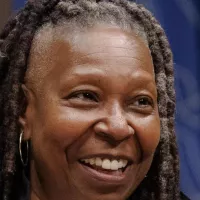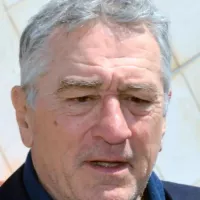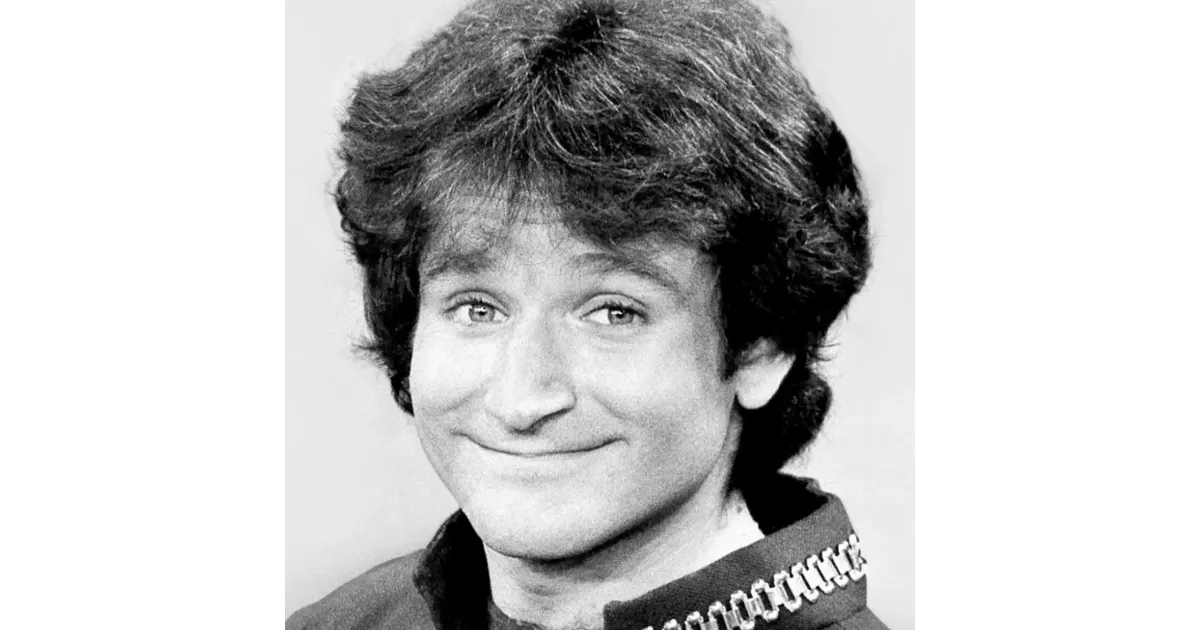Robin Williams was a highly acclaimed American actor and comedian celebrated for his exceptional improvisational talent and diverse character portrayals in both comedic and dramatic roles. Widely regarded as one of history's greatest comedians, he amassed numerous awards, including an Academy Award, multiple Emmy and Golden Globe Awards, and several Grammy and Screen Actors Guild Awards. In 2005, he received the prestigious Cecil B. DeMille Award, solidifying his lasting impact on the entertainment industry.
1906: Birth of Father, Robert Fitzgerald Williams
In 1906, Robert Fitzgerald Williams, Robin Williams' father, was born.
1922: Birth of Mother, Laurie McLaurin
In 1922, Laurie McLaurin, Robin Williams' mother, was born.
1969: High School Graduation
In 1969, Robin Williams graduated from Redwood High School and was voted "Most Likely Not to Succeed" and "Funniest" by his classmates.
1973: Attended Juilliard School
In 1973, Robin Williams was accepted into the Juilliard School in New York City on a full scholarship.
1974: Worked as a busboy
From the summer of 1974, Robin Williams worked as a busboy at The Trident in Sausalito, California.
1975: Running with West Side YMCA
In 1975, Robin Williams, as part of the West Side YMCA runners club in New York City, ran a 10K in Central Park in 34:21 minutes, showing promising athletic ability.
1976: Started Stand-up Comedy
In 1976, Robin Williams began performing stand-up comedy in the San Francisco Bay Area at the Holy City Zoo.
1976: Left Juilliard School
In 1976, Robin Williams left the Juilliard School during his junior year, after being advised that the school had nothing more to teach him.
1976: Meeting Valerie Velardi
In 1976, Robin Williams met Valerie Velardi while working as a bartender in a San Francisco tavern, leading to their subsequent relationship.
1976: Left Juilliard and worked as a busboy
In 1976, Robin Williams worked as a busboy at The Trident in Sausalito, California, and he also left Juilliard during his junior year.
1977: Minor Role in Can I Do It... 'Til I Need Glasses?
In 1977, Robin Williams had a minor role in the low-budget comedy film "Can I Do It... 'Til I Need Glasses?".
1977: Television Debut on Laugh-In
In 1977, Robin Williams made his television debut on the revival of the show "Laugh-In", after being spotted at The Comedy Store by George Schlatter. He also performed a show at the L.A. Improv for Home Box Office.
1978: Mork & Mindy Sitcom
In 1978, Robin Williams began starring as the alien Mork in the ABC sitcom "Mork & Mindy", launching him to wider fame.
1978: Marriage to Valerie Velardi
In 1978, Robin Williams married actress Valerie Velardi, marking the beginning of their relationship after a live-in relationship with Elayne Boosler.
1978: HBO Comedy Special
In 1978, Robin Williams starred in his first HBO comedy special, "Off The Wall".
1978: Cast as Mork in Happy Days
In 1978, Robin Williams was cast as the alien Mork in an episode of the television series "Happy Days", titled "My Favorite Orkan".
March 12, 1979: Time Magazine Cover
On March 12, 1979, Robin Williams appeared on the cover of Time magazine due to the success of "Mork & Mindy".
August 23, 1979: Rolling Stone Cover
On August 23, 1979, Robin Williams appeared on the cover of Rolling Stone magazine, photographed by Richard Avedon.
1979: Grammy Award for Reality ... What a Concept
In 1979, Robin Williams won a Grammy Award for Best Comedy Album for the recording of his live show at the Copacabana, "Reality ... What a Concept".
1980: Reality ... What a Concept Album Release and Popeye Film Role
In 1980, Robin Williams released the comedy album "Reality ... What a Concept" and also received his first leading film role in the movie "Popeye".
1980: Starred in Popeye
In 1980, Robin Williams starred as the title character in the film "Popeye", marking his first starring performance in a film.
1982: Starred in The World According to Garp
In 1982, Robin Williams starred as the lead character in "The World According to Garp".
1982: Quitting drugs and alcohol
In 1982, the death of John Belushi from a drug overdose, along with the birth of his son Zak, led Robin Williams to quit drugs and alcohol. Williams also began cycling to alleviate his depression.
1982: End of Mork & Mindy
In 1982, the sitcom "Mork & Mindy", starring Robin Williams and Pam Dawber, concluded its run after four seasons.
1982: Mork & Mindy Ended
In 1982, the television sitcom "Mork & Mindy", starring Robin Williams, ended its run.
1983: Birth of son Zachary Pym
In 1983, Robin Williams and Valerie Velardi welcomed their son, Zachary Pym, into the world.
1983: An Evening with Robin Williams
In 1983, Robin Williams starred in his second HBO comedy special, "An Evening with Robin Williams".
1983: Starred in The Survivors
In 1983, Robin Williams starred in the film "The Survivors".
1984: Role in Moscow on the Hudson
In 1984, Robin Williams starred in Moscow on the Hudson, showcasing his dramatic acting abilities.
1986: Co-hosted the 58th Academy Awards
In 1986, Robin Williams co-hosted the 58th Academy Awards, showcasing his versatility and stage presence.
1986: A Night at the Met HBO Special
In 1986, Robin Williams starred in his third HBO comedy special, "A Night at the Met".
1986: Starred in Club Paradise
In 1986, Robin Williams starred in the film "Club Paradise".
1986: Establishment of Comic Relief USA
In 1986, Robin Williams, along with Whoopi Goldberg and Billy Crystal, established Comic Relief USA, an annual HBO television benefit devoted to helping the homeless.
1986: Reported affair with Marsha Garces
In 1986, it was reported that Robin Williams began an affair with Zachary's nanny, Marsha Garces, though Valerie Velardi stated the relationship began after their separation.
1987: Death of Father, Robert Fitzgerald Williams
In 1987, Robert Fitzgerald Williams, Robin Williams' father, passed away.
1987: Appearance in Carol, Carl, Whoopi and Robin and Starring role in Good Morning, Vietnam
In 1987, Robin Williams appeared in the sketch comedy special Carol, Carl, Whoopi and Robin alongside Carol Burnett, Carl Reiner, and Whoopi Goldberg. Also in 1987, Williams starred in Good Morning, Vietnam as Adrian Cronauer, a radio shock jock, earning an Academy Award nomination for Best Actor.
1987: Oscar nomination for Good Morning, Vietnam
In 1987, Robin Williams received an Oscar nomination for his role in the movie "Good Morning, Vietnam".
1987: Golden Globe for Good Morning, Vietnam
In 1987, Robin Williams won the Golden Globe Award for Best Actor—Motion Picture Musical or Comedy for his role in Good Morning, Vietnam.
1988: Divorce from Valerie Velardi
In 1988, Robin Williams and Valerie Velardi divorced, ending their marriage.
1988: Off-Broadway production of Waiting for Godot and film The Adventures of Baron Munchausen
In 1988, Robin Williams appeared opposite Steve Martin in an off-Broadway production of Waiting for Godot at Lincoln Center. In 1988, he also appeared in the film The Adventures of Baron Munchausen directed by Terry Gilliam.
April 30, 1989: Marriage to Marsha Garces
On April 30, 1989, Robin Williams married Marsha Garces, who was six months pregnant with their first child, marking a new chapter in his personal life.
1989: Oscar nomination for Dead Poets Society
In 1989, Robin Williams earned an Oscar nomination for his performance in "Dead Poets Society".
1989: Role in Dead Poets Society
In 1989, Robin Williams played an English teacher in Dead Poets Society, a role that inspired a generation and became part of pop culture.
1990: Role in Awakenings
In 1990, Robin Williams played a doctor modeled after Oliver Sacks in Awakenings, a film based on Sacks' book.
1991: Birth of son Cody Alan
In 1991, Robin Williams and Marsha Garces welcomed their son, Cody Alan, into the world, expanding their family.
1991: Role in Hook
In 1991, Robin Williams played an adult Peter Pan in the film Hook, requiring him to lose 25 pounds for the role.
1991: Oscar nomination for The Fisher King
In 1991, Robin Williams received another Oscar nomination for his role in the film "The Fisher King".
1991: Golden Globe for The Fisher King
In 1991, Robin Williams won the Golden Globe Award for Best Actor—Motion Picture Musical or Comedy for his role in The Fisher King.
1992: Playboy Interview on Balancing Work and Life
During a 1992 Playboy interview, Robin Williams discussed his fear of losing his creative abilities and sharpness, and credited his father for instilling the self-confidence to speak about important subjects.
1992: Voice role in FernGully: The Last Rainforest
In 1992, Robin Williams lent his voice to FernGully: The Last Rainforest, adding to his repertoire of animated roles.
1992: Golden Globe for Aladdin
In 1992, Robin Williams received the Special Golden Globe Award for Vocal Work in a Motion Picture for his role as Genie in Aladdin.
1992: Starring in Toys and Aladdin
In 1992, Robin Williams starred in "Toys" and voiced the character of Genie in the animated film "Aladdin".
1992: Voice role as the Genie in Aladdin
In 1992, Robin Williams voiced the Genie in Disney's animated film Aladdin, a role written for him, which became one of his most recognized and best-loved performances. He improvised much of his dialogue and impersonated numerous celebrities. The film was the highest-grossing of 1992 and won a Special Golden Globe Award for Williams's vocal work.
1992: Gilliam's comments on Williams' unique mind
In 1992, Terry Gilliam commented on Robin Williams's unique talent and ability to transition between manic, mad, tender, and vulnerable states.
1993: Role in Mrs. Doubtfire
In 1993, Robin Williams starred in Mrs. Doubtfire, a comedy tinged with pathos, showcasing his range as an actor.
1994: Refusal to sign for The Return of Jafar
In 1994, Robin Williams refused to sign for the direct-to-video sequel to Aladdin, The Return of Jafar, due to Disney breaking an agreement regarding the use of the Genie in advertising.
1995: Starring in Jumanji
In 1995, Robin Williams starred in the family film "Jumanji".
1996: Reprising the role in Aladdin and the King of Thieves
In 1996, Robin Williams reprised his role as the Genie in the second Aladdin sequel, Aladdin and the King of Thieves, after a public apology from Disney.
1996: Starring in The Birdcage and Jack
In 1996, Robin Williams starred in the films "The Birdcage" and "Jack".
1997: Role in Good Will Hunting
In 1997, Robin Williams played a therapist in Good Will Hunting, deeply affecting even some real therapists with his performance.
1997: Starring in Flubber
In 1997, Robin Williams starred in the family film "Flubber".
1997: Role in Deconstructing Harry
In 1997, Robin Williams was directed by Woody Allen, along with Billy Crystal, in Deconstructing Harry. Allen knew that Crystal and Williams had often worked together on stage.
1997: Academy Award for Good Will Hunting
In 1997, Robin Williams won the Academy Award for Best Supporting Actor for his performance in "Good Will Hunting".
1997: Unscripted cameo in Friends
In 1997, Robin Williams, along with Billy Crystal, made an unscripted cameo appearance in an episode of Friends.
1998: Role in Patch Adams
In 1998, Robin Williams starred in Patch Adams, a comedy tinged with pathos, showcasing his range as an actor.
1998: Role in What Dreams May Come
In 1998, Robin Williams starred in What Dreams May Come, a dramatic film exploring themes of love and loss.
December 1999: Singing on The Rolling Stones cover for Children's Promise
In December 1999, Robin Williams sang in French on the BBC-inspired music video of international celebrities doing a cover of The Rolling Stones single "It's Only Rock 'n Roll (But I Like It)" for the charity Children's Promise.
1999: Role in Bicentennial Man
In 1999, Robin Williams starred in Bicentennial Man, a science fiction drama where he played an android learning about humanity.
April 2000: Hosting a talk show for Audible
In April 2000, Robin Williams hosted a talk show for Audible, available exclusively on their website, demonstrating his versatility in audio entertainment.
2001: Death of Mother, Laurie McLaurin
In 2001, Laurie McLaurin, Robin Williams' mother, passed away.
2001: Voice of Dr. Know in A.I. Artificial Intelligence
In 2001, Robin Williams voiced the holographic character Dr. Know in the live-action film A.I. Artificial Intelligence, showcasing his versatility in science fiction.
July 2002: Robin Williams: Live on Broadway
In July 2002, Robin Williams headlined his one-man show, Robin Williams: Live on Broadway, at the Broadway Theatre, showcasing his stand-up comedy talents.
2002: Robin Williams: Live on Broadway DVD
In 2002, Robin Williams released the DVD Robin Williams: Live on Broadway, capturing the success of his one-man show.
2002: Starring in Insomnia and One Hour Photo
In 2002, Robin Williams starred in the critically acclaimed dramas "Insomnia" and "One Hour Photo".
2002: Influence of Peter Sellers
In a 2002 interview in London with Michael Parkinson, Robin Williams cited Peter Sellers, Dudley Moore and Peter Cook as important influences, particularly Sellers's roles in Dr. Strangelove.
2003: Started Drinking Again
In 2003, Robin Williams began drinking again while working on the film The Big White (2005) in Alaska.
2004: Death of Christopher Reeve
In 2004, Christopher Reeve, Robin Williams' close friend, passed away.
2004: Role in The Final Cut
In 2004, Robin Williams starred in the science fiction psychological thriller The Final Cut, playing a professional who edits memories of unsavory people.
2004: Ranked on Comedy Central's list
In 2004, Robin Williams was voted 13th on Comedy Central's list of "100 Greatest Stand-ups of All Time."
2005: Voice Acting in Robots
In 2005, Robin Williams lent his voice to the animated film "Robots".
2005: Golden Globe Cecil B. DeMille Award
In 2005, Robin Williams received the Golden Globe Cecil B. DeMille Award.
2005: Cecil B. DeMille Award
In 2005, Robin Williams was awarded the Cecil B. DeMille Award, recognizing his significant contributions to the entertainment industry.
2006: Checked into Rehab
In 2006, Robin Williams checked into a substance-abuse rehabilitation center in Newberg, Oregon, acknowledging his alcoholism.
2006: Starring in RV and Happy Feet
In 2006, Robin Williams starred in "RV" and lent his voice to the animated film "Happy Feet".
2006: Starring in five movies
In 2006, Robin Williams starred in five movies, including Man of the Year and The Night Listener, demonstrating his continued activity in film.
March 2008: Garces files for divorce
In March 2008, Marsha Garces filed for divorce from Robin Williams, citing irreconcilable differences, leading to the end of their marriage.
August 2008: Announcement of Weapons of Self-Destruction tour
In August 2008, Robin Williams announced his new 26-city tour, Weapons of Self-Destruction, marking his return to stand-up comedy after a six-year hiatus.
2008: Appearance at Israel's 60th Independence Day
In 2008, Robin Williams appeared in Times Square, along with other celebrities, to wish Israel a happy 60th Independence Day, showcasing his support for the country.
March 13, 2009: Heart Surgery
On March 13, 2009, Robin Williams underwent surgery at the Cleveland Clinic to replace his aortic valve, repair his mitral valve, and correct his irregular heartbeat.
March 2009: Hospitalized for Heart Problems
In March 2009, Robin Williams was hospitalized for heart problems, leading to the postponement of his one-man tour.
September 2009: Start of Weapons of Self-Destruction tour
In September 2009, Robin Williams began his Weapons of Self-Destruction tour, showcasing his stand-up comedy across 26 cities.
December 8, 2009: HBO Special Weapons of Self-Destruction
On December 8, 2009, Robin Williams's Weapons of Self-Destruction tour was featured in an HBO Special, bringing his stand-up comedy to a wider audience.
2009: Starring in World's Greatest Dad
In 2009, Robin Williams starred in the critically acclaimed drama "World's Greatest Dad".
2009: Named a Disney Legend
In 2009, Robin Williams was named a Disney Legend for his contributions, including his iconic role as the Genie in Aladdin.
2010: Appearance on Saturday Night Live
In 2010, Robin Williams appeared in a sketch with Robert De Niro on Saturday Night Live, demonstrating his continued presence in comedy and television.
2010: Divorce from Marsha Garces finalized
In 2010, Robin Williams's divorce from Marsha Garces was finalized, ending their marriage.
2010: Donation to Canterbury earthquake relief
In 2010, following the Canterbury earthquake, Robin Williams donated all proceeds from his Weapons of Self Destruction Christchurch performance to help rebuild the city of Christchurch, New Zealand. Half of the proceeds went to the Red Cross and half to the mayoral building fund.
2010: Acknowledged Sobriety Failure
In a 2010 interview, Robin Williams acknowledged his failure to maintain sobriety, but stated he never returned to using cocaine.
March 31, 2011: Broadway debut in Bengal Tiger at the Baghdad Zoo
On March 31, 2011, Robin Williams made his Broadway acting debut in Rajiv Joseph's Bengal Tiger at the Baghdad Zoo at the Richard Rodgers Theatre, marking a new milestone in his career.
2011: Happy Feet film franchise role
In 2011, Robin Williams continued his role in the Happy Feet film franchise, contributing to the success of the animated series.
2011: Voice Acting in Happy Feet Two
In 2011, Robin Williams lent his voice to the "Happy Feet" sequel.
2011: Marriage to Susan Schneider
In 2011, Robin Williams married graphic designer Susan Schneider, and they remained married until his death, sharing a home in Sea Cliff, San Francisco.
2012: Guest-starring roles in Louie and Wilfred
In 2012, Robin Williams guest-starred as himself in two FX series, Louie and Wilfred, showcasing his willingness to engage with contemporary television.
May 2013: Starring in The Crazy Ones
In May 2013, Robin Williams starred in CBS's new series, The Crazy Ones, showcasing his return to sitcom television, though the show was canceled after one season.
October 2013: Early Symptoms of Lewy Body Disease
In October 2013, Robin Williams began experiencing the early symptoms of Lewy body disease, including a sudden spike in fear, anxiety, stress, and insomnia, which worsened over time.
August 11, 2014: Robin Williams' Death
On August 11, 2014, Robin Williams died by suicide at his home in Paradise Cay, California, after struggling with severe depression; he was 63 years old.
August 21, 2014: Ashes Scattered Over San Francisco Bay
On August 21, 2014, Robin Williams's ashes were scattered over San Francisco Bay following his cremation at Monte's Chapel of the Hills in San Anselmo.
September 9, 2014: PBS Special Aired
On September 9, 2014, PBS aired a one-hour special devoted to Robin Williams's career.
2014: Posthumous film releases
After Robin Williams's death in 2014, four films starring him were released: Night at the Museum: Secret of the Tomb, A Merry Friggin' Christmas, Boulevard, and Absolutely Anything, demonstrating his lasting legacy in the film industry.
2014: Comic Relief raised $80 million
By 2014, Comic Relief USA, co-founded by Robin Williams, had raised $80 million to aid the homeless, demonstrating the significant impact of the organization.
2014: Death from Suicide
In 2014, Robin Williams died by suicide in his home in Paradise Cay, California, after suffering from severe depression and being diagnosed with Parkinson's disease. An autopsy revealed diffuse Lewy body disease.
2014: Starring in Night at the Museum
In 2014, Robin Williams starred in "Night at the Museum".
2014: Biography begun by David Itzkoff
In 2014, The New York Times writer David Itzkoff began writing a biography on Robin Williams.
2014: Treatment for Alcoholism
In mid-2014, Robin Williams was admitted to the Hazelden Foundation Addiction Treatment Center in Center City, Minnesota, for treatment for alcoholism.
2015: "Tears of a Clown" Song Dedicated by Iron Maiden
In 2015, British heavy metal band Iron Maiden dedicated a song to Robin Williams, titled "Tears of a Clown", on their album The Book of Souls.
February 29, 2016: "Robin Williams Tunnel" named
On February 29, 2016, a tunnel on Highway 101, north of the Golden Gate Bridge, was officially named the "Robin Williams Tunnel".
2016: Donation of bicycles
In 2016, Robin Williams's children donated 87 of his bicycles to support the Challenged Athletes Foundation and Christopher & Dana Reeve Foundation, honoring his passion for cycling and charitable causes.
2017: "Robin Williams Meadow" renamed
In 2017, Sharon Meadow in San Francisco's Golden Gate Park, the home of the annual Comedy Day, was renamed "Robin Williams Meadow".
2018: HBO Documentary and Biography Publication
In 2018, HBO produced a documentary about Robin Williams's life, titled Robin Williams: Come Inside My Mind, and David Itzkoff's biography, Robin, was published.
2018: Velardi's statement in documentary
In the 2018 documentary, Robin Williams: Come Inside My Mind, Valerie Velardi stated that the relationship between Robin Williams and Marsha Garces began after she and Robin had separated.
September 2020: Robin's Wish Documentary Release
In September 2020, Vertical Entertainment released a documentary titled Robin's Wish, which explores Robin Williams's battle with Lewy body dementia.
May 2022: Induction into the National Comedy Center
In May 2022, Robin Williams was inducted into the National Comedy Center in Jamestown, New York.
Mentioned in this timeline
Home Box Office HBO is an American pay television service...
CBS Broadcasting Inc CBS is a prominent American commercial broadcast...
California is a U S state on the Pacific Coast...
Saturday Night Live SNL is a late-night live sketch comedy...

Whoopi Goldberg born Caryn Elaine Johnson is a highly acclaimed...

Robert De Niro is a highly acclaimed American actor director...
Trending

43 minutes ago Eileen Gu Dominates Halfpipe, Secures Gold and Sixth Olympic Medal in Career.
43 minutes ago Yamamoto Shines Before Classic, Ready for Dodgers; Eyes 2026 Dominance
43 minutes ago US-Mexico Military Cooperation: Bipartisan Effort Saves Exercise, Navy SEALs Train, Cartels Targeted.

43 minutes ago Paul Mescal and Gracie Abrams Make Red Carpet Debut at the BAFTAs 2026

3 hours ago Priyanka Chopra stuns in Dior and Gaurav Gupta at 'The Bluff' premiere.
3 hours ago Puerto Vallarta: Vehicle Fires and Roadblocks Disrupt Sunday Morning
Popular

Jesse Jackson is an American civil rights activist politician and...

Barack Obama the th U S President - was the...

Bernie Sanders is a prominent American politician currently serving as...

Ken Paxton is an American politician and lawyer serving as...

Michael Joseph Jackson the King of Pop was a highly...
WWE Raw a professional wrestling television program by WWE airs...
